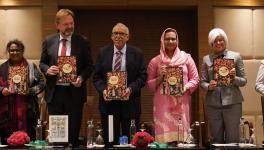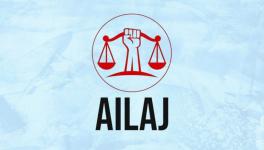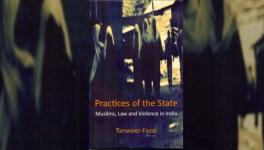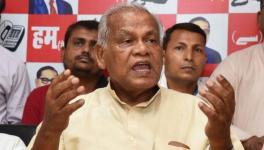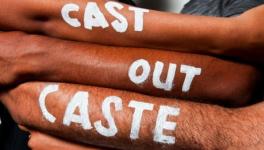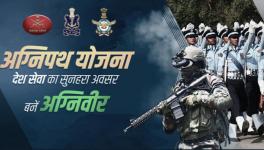UP Elections: Muslims Want Vikas too —but Bhaichara Comes First
Chitaura, Uttar Pradesh. | Image By Pragya Singh.
Kawaal (Muzaffarnagar, UP): It is no secret that in Western Uttar Pradesh, the Bharatiya Janata Party (BJP) is trying to forge its electoral fortunes on the anvil of a divisive election campaign. In this region, which witnessed communal violence in 2013, Chief Minister Yogi Adityanath and his party leaders have repeatedly deployed dog-whistle politics to hamstring voters into communal positions.
Electorally isolating the Muslims from the Hindus would sharpen the edge of Hindutva and blunt the impact of the votes cast against BJP. And it is Muslims who bear the brunt of this strategy. For, the more communally divided the electorate, the more even the rival outfits of BJP would tend to distance themselves from Muslims.
Conventional wisdom would say that Muslims must feel disgruntled, even angry, that the political parties that wish to gather their votes to return to power rarely mention them in their campaign speeches. Nowhere should this sentiment be more potent than in Kawaal village of Muzaffarnagar district and around. For, in 2013, three brutal killings in Kawaal had provided the spark that lit the communal flare-up, which spread to at least four of the nine administrative blocks in Muzaffarnagar.
NewsClick asked Muslims of all ages in this region what they feel about the silence of parties they support, from Samajwadi Party to Bahujan Samaj Party and Congress to Rashtriya Lok Dal (RLD). How do they view their political untouchability? Do they feel upset that even those who seek their votes hardly ever visit them? These parties rarely challenged BJP’s strategy to ride on communal polarisation over the past five years, as lynch mobs roamed free, a law was passed against ‘Love Jihad’, encounter killings took place and the anti-CAA (Citizenship Amendment Act) protests were stamped out. So, how does this influence the voting behaviour of Muslims, and their attitude towards Hindus? The answers were both surprising and a testament to the limits of hate politics and the political acumen of regional Muslims.
The villages NewsClick visited are Kawaal in the Jansath block, Chitaura in the Khatauli block, and Hussainpur in the Budhana block of Muzaffarnagar, places where there was communally-tinged violence in 2013.
In Chitaura, when Ishrat Ali, a middle-aged jaggery trader, sitting with a group by the roadside, was asked about the silence of SP leader Akhilesh Yadav on Muslims and their concerns, he said bluntly: “If Akhilesh does speak up, it should be about vikas—progress.”
To Shadab, also a trader, the silence of BJP’s rivals is no surprise. He said: “When Azam Khan (SP leader) was arrested, did anybody speak out? When RLD leader Jayant Chaudhary was thrashed by the police for visiting the Hathras rape victim, did jats organise a movement to support him? After clashes between dalits and rajputs in Saharanpur, did anybody rise to defend them? Chandrashekhar (Bhim Army chief) spoke out for dalits, it is true, but he was packed off to jail. Whoever speaks out against this government gets crushed, so what can leaders of non-BJP parties do—they are helpless!”
To counter this argument, the same question was asked differently. Did not the farmers get what they wished—the farm laws repealed—when they rose in protest and did not the Opposition parties openly support them? Why, then, must Muslims contend with neglect?
“The government did not repeal the farm laws for 11 months, and the farmers sacrificed numerous lives. Besides, Muslim farmers were part of this struggle—we ourselves supported it, so the question of politicians’ silence does not arise,” said Abdul Ghaffar, who has a small electrical pump-set business in Chitaura. He added: “When the financial position of farmers declined, we traders who depend on them also faced economic reversals. Our fates are linked, regardless of which community we belong to.”
On the question, does not Asaduddin Owaisi of the All India Majlis-e-Ittehadul Muslimeen (AIMIM)—whose campaign in Uttar Pradesh includes fiery speeches that talk of subaltern (especially Muslims and backward class) angst—reflect the sort of leadership the Muslims desire and trust?
“No”, was their response, in unison.
“We do not trust him, for he speaks the language of divisions, not togetherness,” said Ishtiaque, who runs a small kirana store in Chitaura.
Shadab interjected: “If I criticise this government, I will be jailed by the state. Therefore, Owaisi must have an agenda. Why else is he allowed to roam free despite sharply and repeatedly critiquing the BJP?”
It seemed the entire gathering agreed that Owaisi was an “outsider from Telangana” and had no place in the polling booths of UP.
Shifting tack, NewsClick asked them if the years of communal politics and subterranean inter-community stresses, coupled with the economic declines since 2016, had fuelled a sense of disquiet and resentment against Hindus, if not mainstream political parties.
“The BJP ruined the bhaichara [brotherhood] built by Chaudhary Charan Singh [former Prime Minister and Lok Dal leader] between jats and Muslims. His grandson Jayant is bringing that bhaichara back. We are clear about it: What we seek is love, not divisive speeches from Owaisi,” said Jabbar, another jaggery trader. All present nodded in unison.
One wondered, would Muslims vote for a party to defeat BJP because the latter had not offered them a share in the development pie? Put another way, could temptation turn heads with this group? So, when asked: what if a party promises wealth and well-being for all, what if it assures employment, education for children, better healthcare and rural roads, clean drinking water, higher farm prices. And, what if it seeks just one sacrifice in exchange—that the people must forego bhaichara or brotherhood between communities?
Rashid, another jaggery trader, promptly responded: “Vikas nahi, mohabbat chalegi—development must not come at the cost of affection between communities,” adding: “What we need is sukoon, chain—peace and quiet. Fasaad se hum dartey hain—we fear discord.”
Rashid
In the past three elections of 2014 (Lok Sabha), 2017 (Assembly) and 2019 (Lok Sabha) and in the decades before, many members of this group in Chitaura had voted for the parties they traditionally supported or believed could defeat BJP. Their electoral loyalties have shifted from Congress to RLD, then SP and now back to RLD, its ally.
Yet, when asked again if their calculations had come to a nought more often or why would they not desire development, considering society is already divided? Would they prefer to struggle to make ends meet, or worse, see fortunes decline over time? Why not go for comfort, whichever outfit offers it? Who knows, wealth and well-being may foster friendly ties between social groups over time? After all, did not farm leader Rakesh Tikait recently say that while bhaichara has suffered during BJP rule, it also could not provided vikas or development. What if, hypothetically, they could pick Vikas at the cost of bhaichara?
Not with this group! “Vikas and bhaichara are two very different things. BJP only offers hate, nothing else,” asserted Shadab.
But what if a party other than the BJP offered Vikas at the cost of bhaichara?
“That would be like slaughtering the chicken and still not getting to enjoy the meal—we would lose both,” interjected Ali.
“If there is mohabbat, there will be vikas, otherwise we would just destroy one another,” said Jabbar, who proceeded to narrate a tale, a parable, of a family that had three hungry men named Kamyabi, Mol and Mohabbat [Success, Wealth and Love] waiting at its doorstep, asking for a meal. When the family asked Mohabbat to enter to eat his dinner first, Kamyabi and Mol followed him indoors on their own. “That is why brotherhood is more important than everything else,” he concluded.
But is the seemingly endless wait of Muslims for peace and accord acceptable, considering it means their silence as a community? After all, in Western Uttar Pradesh, the Muslims are numerically significant and include a sizeable well-off and educated section. Why would they prefer to harbour silence instead of—like the farmers of Punjab or the jats who have rallied behind Tikait and RLD—organising a movement expressing their angst against hate speeches and demanding their share in political representation?
“You have to understand the silence of the 20% (Muslims of UP),” said Rashid, the oldest in the gathering, adding: “We cannot organise a movement. We have to remain silent for the sake of peace in the country. We must keep quiet for the sake of social peace for everybody.”
Others present spoke about how when Muslims or their leaders spoke out, they were branded anti-India by rival formations. This polarises the electorate and makes everyday life more difficult.
“We do feel hurt by comments on social media about Muslims, or when leaders talk about us in disparaging terms. We belong here and shall live and die here, but our speaking out, or organising a campaign, whether for education or better services during the COVID pandemic, or for politics, would only create problems,” said Ali. He means that even their demands for better public services would get labelled as a demand of and by Muslims, thereby allowing BJP to sharpen its Hindutva politics.
“Our silence is what these times demand of us, our majboori (compulsion)—we have no choice but staying quiet. We simply do not want any fight,” said Rashid.
BJP’s Rumour Mill
These days, BJP leaders are reminding the electorate of the Muzaffarnagar violence and painting Muslims as the aggressors and Hindus as victims of that episode. In those riots, at least 50,000 Muslims were displaced from their homes in four blocks of rural Muzaffarnagar, while 20 Hindus and 42 Muslims had died.
Based on this theory of ‘Hindu victimhood’, BJP and its supporters are spreading the rumour that if the gathbandhan [an alliance of SP and RLD] comes to power, Muslims will come to “dominate” over Hindus, a narrative that has some currency among sections of Hindu voters.
“How will we dominate or trouble anybody—we don’t even have jobs or livelihoods like before, and have slipped below the weakest section, the dalits, on some indices? We don’t need any party to speak on our behalf or talk about us. We need peace and love, so we can all build a better tomorrow,” said Rashid.
The story is not too different in Kawaal village. Here, in August 2013, the killing of three youngsters, Shahnawaz, Gaurav and Sachin, had sparked off polarising campaigns led by leaders belonging to a variety of political outfits, which ultimately culminated in riots.
In Kawaal, Pradeep Kumar, a middle-aged jatav plastic and spare-parts shopkeeper, has decided to move away from his traditional BSP in this election. But he is unsure whom to vote for. “I don’t think the BSP will get many votes, so I am considering other options,” he said.
While BSP has fielded a Muslim candidate, perhaps hoping to gather core dalit voters along with Muslims, Pradeep knows that the local Muslim residents are rallying behind the gathbandhan’s candidate, a popular Hindu backward-class leader, and not BSP’s Muslim candidate. “So, I am considering voting for BJP, which has also fielded a Hindu from the same backward community.”
Pradeep is also swinging from BSP to BJP due to the “charms of Hindutva” and his dislike of SP, in which he sees a representation of anti-dalit politics. He also has concerns that SP rule will mean “trouble from Muslims”.
However, when Pradeep and Ifthikar, a local middle-class farmer, were asked which of the two they prefer—vikas or bhaichara—both unanimously picked the latter. “Vikas se pehle bhaichara,” said Ifthikar. “Sahmati se badhiya kuch nahi—nothing is better than togetherness,” said Pradeep.
Pradeep and Ifthikar.
Both agreed that this was a big change in their own mindsets since 2013, when Hindutva and anti-Muslim sentiments shaped most aspects of public and interpersonal lives in their village.
Ayesha, 35, is the pradhan (village head) of Hussainpur village in the Budhana block. In her overcrowded village, like in Kawaal and Chitaura, live largely the “lower” backward Hindu and Muslim communities, a few upper caste families, and some jat families. “Our public is majdoor—working class—regardless of religion. They need help from the state, and when they get it, they do develop a soft corner for the government. Even the poorest Muslims felt indebted when they got food during COVID lockdowns, for they had nothing else. However, the Yogi government must ensure that Muslims are not targeted for their attire or appearance, nor should leaders say things like ‘garmi nikal dengey’,” she said.
When social or economic assistance comes as part of a package deal that includes hate speech targeted against Muslims, people get rattled and anxious.
“People begin to suspect that the government is playing mind games with them. Muslims especially worry that the government first reduced their avenues for employment, then provided them with necessities, such as rations, to make them even more dependent”, said Ayesha.
So, when Western Uttar Pradesh residents line up to vote on February 10, those who vote for BJP would do well to remember—everybody wants vikas, but not all are willing to sacrifice bhaichara for it.
Get the latest reports & analysis with people's perspective on Protests, movements & deep analytical videos, discussions of the current affairs in your Telegram app. Subscribe to NewsClick's Telegram channel & get Real-Time updates on stories, as they get published on our website.









